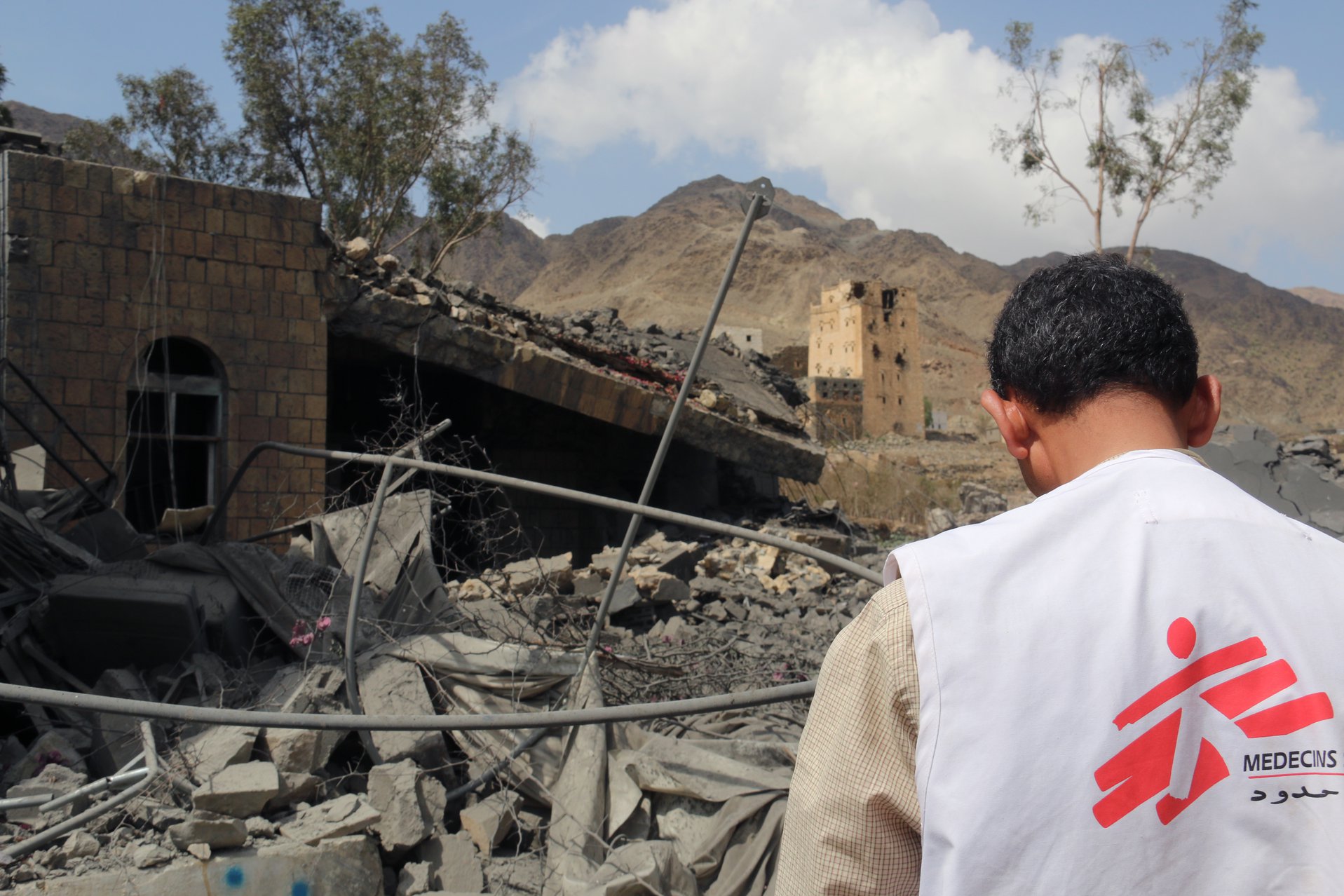“I scroll aimlessly on my phone, stumbling onto video footage of Shaban Al-Dalou, a 19-year-old man engulfed in flames outside Al-Aqsa Hospital in Gaza. I immediately recognize the hospital and nearby flimsy tents crammed with displaced families. I had worked as a doctor on those very grounds, which became a makeshift village with its subculture.”
“In my time working as a pediatrician in Gaza, I saw starving babies gasping for air and reaching for their mothers, who were buried under rubble. I treated an entire family who had sustained third-degree burns, eyes blistered shut, children’s genitalia scorched and disfigured from bombardment,” describes Dr Seema Jilani.
Dr Seema Jilani is a pediatric specialist with extensive experience working in Afghanistan, Israel, Gaza, the West Bank, Sudan, Lebanon, Egypt, and the Balkans. Her radio documentary, “Israel and Palestine: The Human Cost of the Occupation,” was nominated for a Peabody Award.
“The war in Gaza has taken its toll on us as mothers. I chose to leave my seven-year-old daughter behind to treat war-wounded children who resembled her, except that their limbs hung by a thread of flesh and their bodies were charred black beyond recognition,” Dr Jilani writes while describing her painful experiences in Gaza.

The world has been enduring violence for a long time, with regions such as Kashmir, Palestine, Southern Africa, Yemen, and Ukraine experiencing significant bloodshed. A large part of the population is at serious risk due to violence, bombings, and unlawful killings.
In 2025, we have seen a sudden rise in conflicts among various nations. In May 2025, India launched an attack on Pakistan, followed by Israel’s attack on Iran in June. The conflicts remain unresolved, and the region feels like a ticking time bomb that could explode at any moment, putting the lives of billions in danger.
According to the United Nations Office for the Coordination of Humanitarian Affairs, nearly 58,400 people have been killed in Gaza since October 2023, as of June 2025. Hospitals in the region are facing a severe crisis due to the ongoing conflict, with many facilities either damaged or destroyed, and a critical shortage of essential supplies and staff. The situation has rendered hospitals barely functional, operating at dangerously high capacity, which severely impacts their ability to provide adequate care.
In May 2025, the World Health Organization published a new report following a renewed intensification of attacks on Gaza by Israel. The report reveals that 28 attacks on healthcare facilities and hospitals have been recorded. Of the 36 hospitals in the Gaza Strip, only 19 remain operational. These hospitals include just one that is providing basic care to the remaining patients still inside. They are struggling under extreme supply shortages, a lack of health workers, persistent insecurity, and a surge in casualties, all while staff are forced to work in impossible conditions.
“We realized early on that we would likely be one of the last hospitals standing in southern Gaza,” says Dr. Michael Grady, a volunteer with the International Medical Corps who spent six weeks at one of our field hospitals in Gaza. “I worked at a field hospital that lacked CAT scanners and MRI machines, relying solely on basic diagnostic skills to examine patients.”
Dr Grady, who was born and raised in Massachusetts, has been recognized with the International Medical Corps’ Henry H. Hood Distinguished Service Award 2024 for his dedication and bravery as a volunteer. Over the past 30 years, he has actively volunteered to provide medical care and has previously worked in Haiti and West Africa with various non-profit organizations.

When Russia invaded Ukraine in February 2022, Dr Grady sought an organization where he could offer his services. A close friend introduced him to the International Medical Corps. He was impressed by the organization’s focus on training and security and decided to join their team in Ukraine.
“Ukraine was different from other humanitarian work I’ve done,” Dr Grady explains. “It was more about teaching. The individuals who had been providing emergency care before the war were recruited to the front lines, leaving significant gaps in their healthcare system.”
Along with several volunteers and staff members, Dr Grady provided comprehensive emergency and trauma care training to Ukrainian healthcare workers, public safety personnel, and other community leaders.
Soon after, the International Medical Corps deployed a field hospital to Gaza to provide urgently needed healthcare to civilians affected by the war. Despite the dangers, Dr Grady felt compelled to help and joined the International Medical Corps’ initial field hospital in southern Gaza, where he stayed for over a month.
“Gaza was an extremely intense place to work,” he recalls. Initially, we anticipated treating a few dozen patients a day. But suddenly, the numbers skyrocketed to 100 patients daily, and then to 600. We expected only a couple of cases in the emergency department each day. Instead, we were overwhelmed with 30, 40, and then 50 critically injured patients arriving one after another due to explosions.”
Dr Grady shared the painful memories of patients and their families during his discussions with CNN and CBS News regarding the humanitarian crisis in Southern Gaza. He explained that working in a war zone is always challenging for doctors and physicians, but what he observed in Gaza was particularly painful and heartbreaking. At times, the medical staff would burst into tears, finding it difficult to offer compassion and hope to the patients and their families.

When International War Laws Fail, and You Still Have to Deliver Services!
“International humanitarian law often feels like a meaningless phrase in these times. The indiscriminate attacks on hospitals and civilians—either directly targeted or conveniently labeled as collateral damage—add an extra layer of complexity to the situation.”
“Medical staff sometimes find themselves questioning whether their work in a war zone is worth the risks they take. The answer to this question should be obvious from the start; it is a question that should never have to be asked, especially given the severe humanitarian needs present.”
“Wartime doctors often face moments of helplessness. They understand that there will always be another surge of patients arriving at the hospital,” as Dr Alan de Lima Pereira noted. He served in Yemen during the war in 2016, which he described as another forgotten conflict where the most vulnerable and innocent suffered the most.
Humanity Over Personal Safety?
“I have never questioned my safety. As a doctor dedicated to humanitarian service, I have always felt secure; I have never felt at risk. In my view, my commitment to serving others and my profession as a humanitarian doctor provide me with protection,” says Dr Louise Koster.
“By using my medical expertise for the benefit of humanity, I experience the freedom and opportunity to fully trust in life. I find safety within my commitment; it is a sanctuary and a space of truth. I have learned to trust life by following my true path. By dedicating myself to humanitarian service, I am assured that life will protect and care for me.”
Dr Louis Koster has been a spiritual teacher, medical doctor, and coach in the self-help industry for over 30 years. He has worked with Médecins Sans Frontières (MSF) during the war in Liberia. He suggests that if you are an empath and want to test your strengths and beliefs, consider working as a medical doctor or volunteer in war zones. This experience will profoundly change your life!
References:
- https://internationalmedicalcorps.org/story/bringing-training-hope-and-healing-to-war-zones/
- https://www.theguardian.com/global-development/2016/mar/16/doctors-yemen-war-wounds-medical-challenge-msf
- https://lithub.com/a-war-zone-pediatrician-on-what-comes-after-the-horrors-of-a-gaza-emergency-room/
- https://louiskoster.com/2016/01/23/my-life-as-a-medical-doctor-in-war-zones/
- https://www.who.int/news/item/22-05-2025-health-system-at-breaking-point-as-hostilities-further-intensify–who-warns
More from the Author: Gaza and the Vicious Cycle of Transgenerational Trauma

Saadeqa Khan is the founder, CEO, & Editor-in-Chief of Scientia Pakistan. She’s a member of the Oxford Climate Journalism Network (Second Cohort) and NASW. Saadeqa is a fellow of NPF Washington, The Falling Walls Foundation, and the Science Journalism Forum. Saadeqa has won several international journalism grants and awards for her reports.

